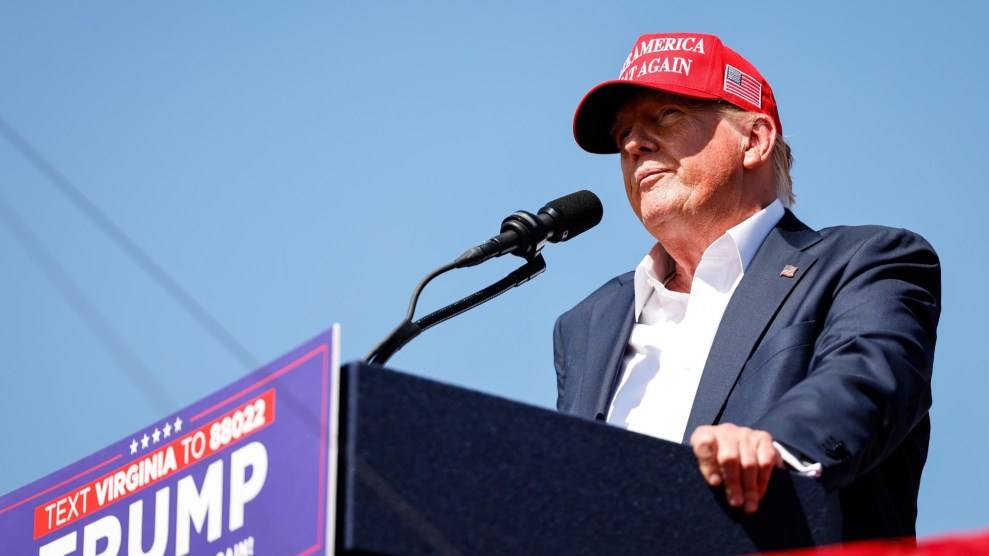WHY WOULD YOU BELIEVE A STUPID, IRRATIONAL PERSON WHEN IT
WOULD SAVE YOU MONEY?
IT'S SIMPLE!
Reducing your energy consumption puts money in your pocket!
Renewable Energy is CHEAPER!
Think for yourself!
Trump’s Bizarre Culture War Rhetoric Is Eroding Public Support for Clean Energy
The former president keeps attacking climate solutions with nonsensical remarks.
This story was originally published by the Guardian and is reproduced here as part of the Climate Desk collaboration
When Donald Trump embarked upon a lengthy complaint at a recent rally about how long it takes to wash his “beautiful luxuriant hair” due to his shower’s low water pressure, he highlighted the expanding assault he and Republicans are launching against even the most obscure environmental policies—a push that’s starting to influence voters.
In his bid to return to the White House, Trump has branded Joe Biden’s attempt to advance electric cars in the US “lunacy,” claiming such vehicles do not work in the cold and that their supporters should “rot in hell.” He’s called offshore wind turbines “horrible,” falsely linking them to the death of whales, while promising to scrap incentives for both wind and electric cars.
But the former US president and convicted felon, who has openly solicited donations from oil and gas executives in order to follow industry-friendly priorities if re-elected, has also spearheaded a much broader attack on a range of mundane rules and technologies that enable water and energy efficiency.
At a June rally in Philadelphia, Trump claimed Americans are suffering from “no water in your faucets” when attempting to wash their hands or hair. “You turn on the water and it goes drip, drip,” he said. “You can’t get [the soap] off your hand. So you keep it running for about 10 times longer.” Trump complained it takes 45 minutes to wash his “beautiful luxuriant hair” and that dishwashers don’t work because “they don’t want you to have any water.”
Trump’s niche fixation is not new—while in office he complained about having to flush a toilet 10 times and that newer, energy-efficient lightbulbs made him look “orange.” His administration subsequently rolled back efficiency standards for toilets, showers, and lightbulbs, rules that Biden subsequently restored.
But Republicans in Congress are now following Trump’s lead, introducing a flurry of recent bills in the House of Representatives targeting energy efficiency standards for home appliances. The bills—with names such as the “Liberty in Laundry Act,” “Refrigerator Freedom Act,” and the “Clothes Dryers Reliability Act”—follow a conservative furore over a confected, baseless claim the Biden administration was banning gas stoves, which prompted further GOP legislation.
“No government bureaucrat should ever scheme to take away Americans’ appliances in the name of a radical environmental agenda, yet that is exactly what we have seen under the Biden administration,” said Debbie Lasko, a Republican Congressman and sponsor of the ‘Hands Off Our Home Appliances Act’, which restricts new efficiency rules on appliances and passed the House in May. These bills have no chance of agreement in the Democratic-held senate.
Bipartisan support for renewables is weakening in the wake of Trump’s strange and misleading attacks on things like wind power, electric cars, and efficiency standards.
“We are seeing a lot of these advances, like clean cars and more efficient appliances, being swept up into the culture wars,” said Ed Maibach, an expert in public health and climate communication at George Mason University.
“Most Americans’ instincts are that these are good things to have, but it’s clear that Donald Trump and others think there’s political gain in persuading people this isn’t the case. These voters are being fed a story by people they shouldn’t really trust.”
There has been a sharp political divide over the climate crisis for several years in the US, with Trump calling global heating a “hoax” and dismissing its mounting devastation. “It basically means you’ll have a little more beachfront property,” the former president said of the impact of sea level rise last month.
During last week’s presidential debate, Trump boasted, baselessly, he achieved the “best environmental numbers ever” when president and called the Paris climate accords a “ripoff” and a “disaster.” Biden rebuked his rival, saying he didn’t do a “damn thing” about the climate crisis.
Despite this split, there has long been strong bipartisan support across all voters for renewables such as solar and wind, with most of the clean energy jobs and investment unleashed by Biden’s major climate bill flowing to rural, Republican districts. But this is beginning to weaken in the wake of Trump’s attacks, research by Maibach and colleagues has found.
A new poll, released by the Pew Research Center on Thursday, underscored this trend—support for new solar farms has slumped to 78 percent across all Americans, down from 90 percent just four years ago. Backing for expanding wind power has dropped by a similar amount, while interest in buying an electric vehicle is significantly lower than a year ago, with just 29 percent of people saying they would consider an EV, down from 38 percent in 2023.
This change is being driven by a drop in support among Republican voters, Maibach said, with clean energy and cars on track to become as contentious as global heating is now to many conservatives. “That support for clean energy has been there across Republicans and Democrats for a long time but it is starting to erode,” he said.
“It’s a trend that has been developing for at least the past five years. There is a tug of war going on between what people’s instincts are telling them, and what voices in their trusted community are telling them.”
Donald Trump Said Really Stupid Things About Climate Today. Here Are 8 Facts He Ignored.
He told Prince Charles the US has “among the cleanest climates there are.”
This story was originally published by the Guardian and appears here as part of the Climate Desk collaboration.
Donald Trump believes the US has a “clean climate”, telling the interviewer Piers Morgan on ITV’s Good Morning Britain that he had informed Prince Charles in a 90-minute conversation that the US “right now has among the cleanest climates there are based on all statistics, and it’s even getting better because I agree with that we want the best water, the cleanest water.”
There are a few important details the president may have overlooked in presenting a clean bill of health for the US environment, so here is a handy reminder.
1) Greenhouse gas emissions
The US is still the world’s second biggest emitter of greenhouse gas emissions, having been overtaken by China more than a decade ago. In per capita terms, however, the US far outstrips China, though it comes below some Middle Eastern states with tiny populations and vast fossil fuel industries. While carbon emissions have been falling, in part because of the switch from coal to gas, Climate Tracker estimates that the US will fail to meet its carbon reduction targets set by Barack Obama, to cut emissions by 26-28 percent below 2005 levels by 2025.
2) Fracking
The US is now one of the world’s biggest gas producers, thanks to fracking, and about half of its oil now comes from the production method, which requires the blasting of dense shale rock with water, sand and chemicals to release the tiny bubbles of fossil fuel trapped inside. This boom has come at a cost, as the vast water requirements are draining some areas dry, and pollutants found near fracking sites include heavy metals, chemicals that disrupt hormones, and particulates. The effects range from memory, learning and IQ deficits to behavioral problems. Leaks of “fugitive” methane are an additional contributor to climate change.
3) Fossil fuel exploration
Not content with the US’s existing conventional oil reserves, and the expansion of the oil and gas industries through fracking, the US fossil fuel industry is seeking new grounds for exploration—among them, the pristine Alaskan wilderness. Drilling in the Alaskan wildlife reserve is a key Trump policy.
4) Fuel efficiency standards
The Trump administration has moved to loosen regulations on fuel efficiency for cars and vans, which were already less stringent than in many other countries. Opponents fear this will increase greenhouse gas emissions and air pollution.
5) International cooperation
Trump’s decision to withdraw from the Paris climate agreement of 2015 cannot legally take effect until after the next presidential election, in an irony of timing. However, the effect can already be seen, in the emboldening of other nations considering a withdrawal, such as Brazil, formerly a strong proponent of action at the UN talks, and the increasing influence of fossil fuel lobbyists.
6) Climate denial
With the president claiming climate change to be a “Chinese hoax”, it is perhaps not surprising that the US has some of the highest rates of climate denial in the world, according to polling by YouGov in collaboration with the Guardian. Despite this, a sizeable majority of the US public—nearly six in 10 people—still agree with the science on climate change, and support action to stave off the worst consequences.
7) Water
Despite Trump’s claim to Morgan that “we want the best water, the cleanest water—it’s crystal clean, has to be crystal clean clear”, his recent actions on water have been an attempt to roll back decades of progress on cleaning up the US water supply. Last December, he announced plans to undo or weaken federal rules that protect millions of acres of wetlands and thousands of miles of streams from pesticide run-off and other pollutants.
8) Air
By rolling back Obama-era measures intended to reduce greenhouse gas emissions from power plants, the Trump administration is also threatening to increase air pollution, as coal-fired power stations will be able to spew out toxins once more, according to 14 states who last year opposed the Environmental Protection Agency’s plans. This is in contrast with China and India, cited by Trump—along with Russia—as having polluted air. Those nations are trying to clean up their pollution with stricter limits on what power plants and other industries can produce.



No comments:
Post a Comment
Note: Only a member of this blog may post a comment.